#biafra
Text
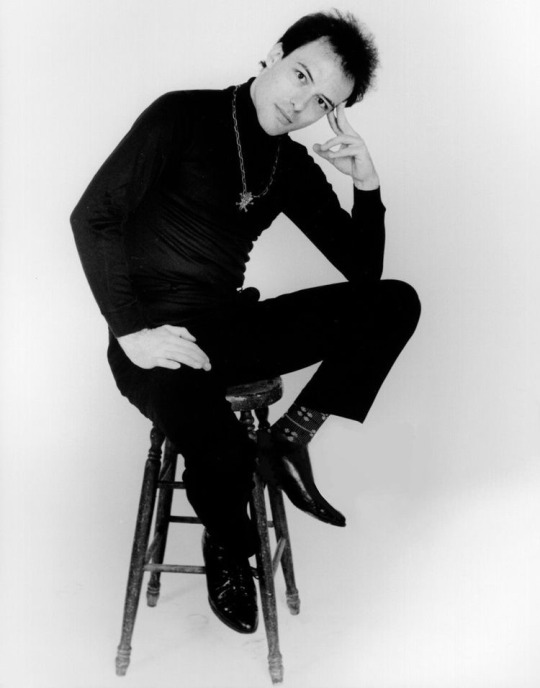
Jello Biafra
#punk#punk rock#70s#punkrock#70s punk#80s punk#80s rock#punkart#rock and roll#punk guy#england#jello biafra#Biafra#deadkennedys#dead kennedys
273 notes
·
View notes
Text
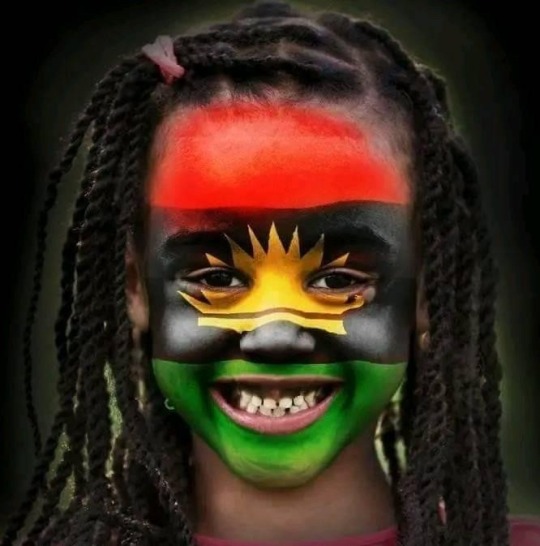
FACTS ABOUT BIAFRA (1967-1970)
*Biafra is a country that existed in West Africa.
*It is the first African country to build and successfully launch a rocket system.
*It was the first African country to build a submarine.
*It had the fastest growing economy at 40% per annum.
*It is one of the only regions in Africa to have a pyramid ( at nsude)
*It was the only country in the world to invest 45% of it's economy into education.
*During the Nigeria/biafra war, 3.5 million people lost their lives, mainly due to starvation.
* Nsibidi of biafra, is one of the oldest writing systems in the world.
*Biafra is home to one of the oldest civilization on Earth, the Igbo civilization.
*The oldest iron smelting site in the world is located in biafra (nsukka).
*The biafran pound remains the only African country to withstand Western sanctions and didn't loose value.
*During the civil war, biafra had cars that were powered by palm oil.
#Amazing
#africa
#black
#truth
76 notes
·
View notes
Photo

Nigerian civil war, 1967.
by atlasmapper
In 1967, following two coups and turmoil which led to about a million Igbos returning to the south-east of Nigeria, the Republic of Biafra seceded with 33-year-old military officer Emeka Odumegwu Ojukwu at the helm.
The Nigerian government declared war and after 30 months of fighting, Biafra surrendered.
Immediate causes of the war in 1966 included ethno-religious violence and anti-Igbo pogroms in Northern Nigeria, a military coup, a counter-coup and persecution of Igbo living in Northern Nigeria. Control over the lucrative oil production in the Niger Delta also played a vital strategic role.
88 notes
·
View notes
Text
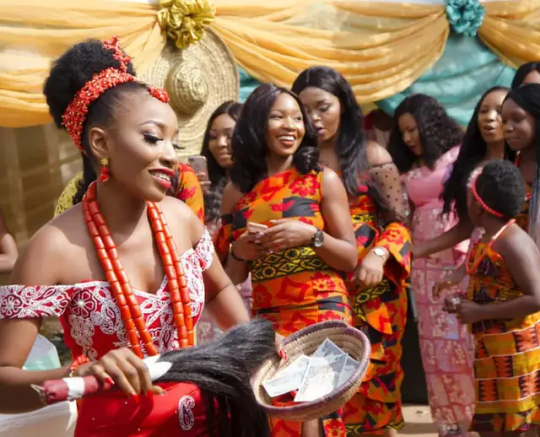
HISTORICAL IGBO TIMELINES:
STONE AGE -MIDDLE AGES.
This is the period dating 1.2million years to 3000BC , the era of homo-erectus found within the areas of ugwuele uturu following the discovery of Archeolean hand axes and stone tools in caves. Clay pots dating 3000BC were recovered at Afikpo and Opi iron slags .Details of this era is buried in archeology .
EARLY HISTORY:
8th-9 th AD : Kingdom of Nri begins with Eze Nri Ìfikuánim.
1434 AD: Portuguese explorers make contact with the Igbo.
1630 AD : The Aro-Ibibio Wars start.
1690AD: The Aro Confederacy is established
1745AD : Olaudah Equiano is born in Essaka, but later kidnapped and shipped to Barbados and sold as a slave in 1765.
1797AD : Olaudah Equiano dies in England as a freed slave.
1807 AD : The Slave Trade Act 1807 is passed (on 25 March) helping in stopping the transportation of enslaved Africans, including Igbo people, to the Americas. Atlantic slave trade exports an estimated total of 1.4 million Igbo people across the Middle Passage
1830 AD : European explorers explore the course of the Lower Niger and meet the Northern Igbo.
1835 AD: Africanus Horton is born to Igbo ex-slaves in Sierra Leone
1855 AD: William Balfour Baikie a Scottish naval physician, reaches Niger Igboland.
MODERN HISTORY:
1880–1905: Southern Nigeria is conquered by the British, including Igboland.
1885–1906: Christian missionary presence in Igboland.
1891: King Ja Ja of Opobo dies in exile, but his corpse is brought back to Nigeria for burial.
1896–1906: Around 6,000 Igbo children attend mission schools.
1901–1902: The Aro Confederacy declines after the Anglo-Aro war.
1902: The Aro-Ibibio Wars end.
1906: Igboland becomes part of Southern Nigeria (the beginning of our problem)
1914: Northern Nigeria and Southern Nigeria are amalgamated to form Nigeria. (escalation of our problem)
1929: Igbo Women's War (first Nigerian feminist movement) of 1929 in Aba.
1953: November Anti Igbo riots (killing over 50 Igbos in Kano) of 1953 in Kano
1960: October 1 Nigeria gains independence from Britain; Tafawa Balewa becomes Prime Minister, and Nnamdi Azikiwe becomes President.
1966: January 16 A coup by junior military officers takes over government and assassinated some country leaders. The Federal Military Government is formed, with General Johnson Aguiyi-Ironsi as the Head of State and Supreme Commander of the Federal Republic.
1966: July 29 A counter-coup by military officers of northern extraction, deposes the Federal Military Government; General Johnson Aguiyi-Ironsi is assassinated along with Adekunle Fajuyi, Military Governor of Western Region. General Yakubu Gowon becomes Head of State.
1967: Ethnoreligious violence between Igbo Christians, and Hausa/Fulani Muslims in Eastern and Northern Nigeria, triggers a migration of the Igbo back to the East.
1967: May 30 General Emeka Ojukwu, Military Governor of Eastern Nigeria, declares his province an independent republic called Biafra, and the Nigerian Civil War or Nigerian-Biafran War ensues.
1970: January 8 General Emeka Ojukwu flees into exile; His deputy Philip Effiong becomes acting President of Biafra.
1970: January 15 Acting President of Biafra Philip Effiong surrenders to Nigerian forces through future President of Nigeria, Olusegun Obasanjo, and Biafra is reintegrated into Nigeria.
References:
Understanding 'Things Fall Apart' by Kalu Ogbaa
Wikipedia
Image Credit: Ukpuru, Pinterest
#kalu#ogbaa#nigerian#ojukwu#emeka#biafra#fulani#hausa#igbos#igbo#nigerian history#igbo history#essaka#africanus horton#african#afrakan#kemetic dreams#africans#afrakans#brownskin#brown skin#african culture
9 notes
·
View notes
Text

Biafra, avril 1968 by Gilles Caron
8 notes
·
View notes
Photo
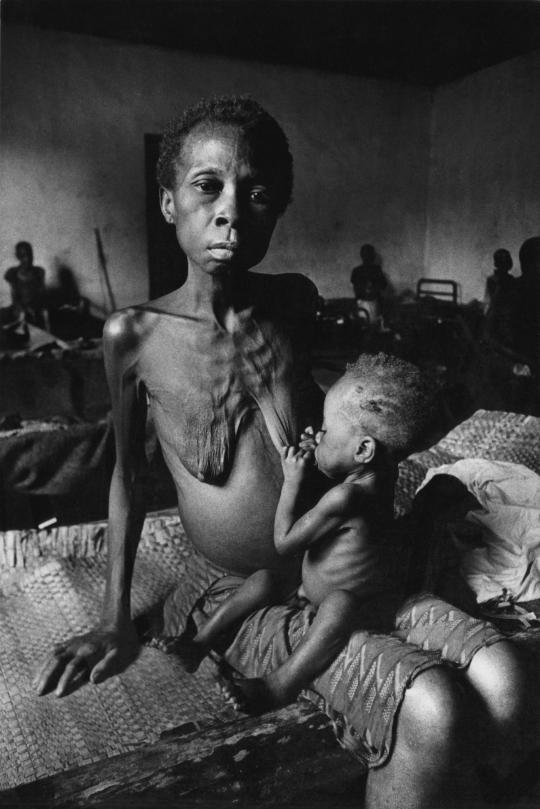
mãe e filho em biafra, 1968, don mccullin
19 notes
·
View notes
Text

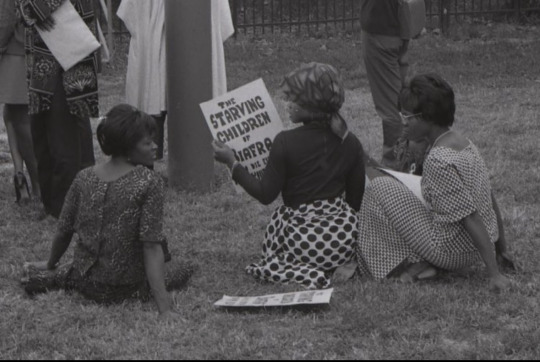
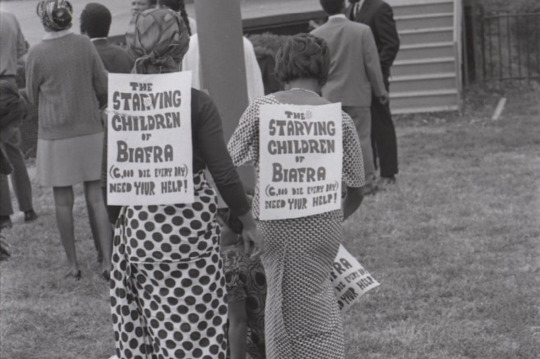
October 12th, 1986 During the course of the war that ravaged the present-day South Eastern Nigeria, the Biafran Association of the Americas staged a mock funeral procession between the Sylvan Theatre and the State Department, Washington D. C. to protest the lack of American aid in Biafra.
A select number of Nigerians who were members of the association, other Nigerians and Americans joined the procession.
Courtesy of The Façade Nigeria, photographed by Patrick Frazier/American University/1968
#diaspora#Biafra#Nigeria#Africa#The Façade Nigeria#1986#war is horrible I swear#this seems so present
5 notes
·
View notes
Text
Esistono due risposte alle cose che ti insegnano a scuola sulla nostra terra: quella vera e quella che devi dire per passare gli esami. Devi leggere tanto e imparare tutte e due le risposte.
Chimamanda Ngozi Adichie, Metà di un sole giallo
#metà di un sole giallo#scuola#vita#imparare#conoscenza#competenze#biafra#verità#realtà#citazione#citazione libro#libro#letteratura#Chimamanda Ngozi Adichie
7 notes
·
View notes
Photo

Jello Biafra
#Jello Biafra#Dead Kennedys#No censorship#no more censorship#censorship#the dead kennedys#biafra#jello#DK
32 notes
·
View notes
Text
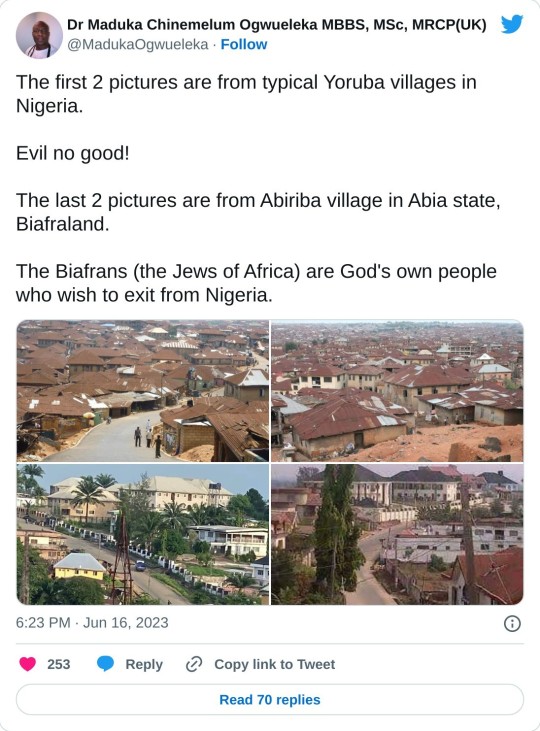
4 notes
·
View notes
Text
Biafran separatists firing on security forces (Nigeria)
5 notes
·
View notes
Text
Half of a Yellow Sun

It cannot be easy to write about war. War is ugly and it drains hope. It shows you how fragile human lives and achievements really are. I have not been through a war so i will not make any generalised observations of tragic wisdom like an imbecile. But what i have been through is quite a number of war novels, based off real events. And i certainly don't remember anything so acutely painful as what Adichie captures in her debut novel.
Starting off with an ordinary Igbo boy gaping in awe at his master's English pronunciation, you feel like you are right there beside Ugwu as he makes sense of his new surroundings. There are names of so many local dishes and you are bound to feel ashamed that you know of so many American and English dishes but no Nigerian ones. When Adichie switches to Olanna's point of view, you feel restless because Ugwu must have been nicer, but no, Olanna is the perfect next narrator. Then, Richard too. Richard tries hard to translate his love for the Igbo-Ukwu art into a great novel, but war and violence make him realise that writing about the sufferings is not his place. So, when Ugwu's is the story that lasts, nothing is more fitting.
Adichie hesitates neither to write of explicit love nor of graphical violence - she writes of the vulgar and delicious female bond that exists between women/ sisters, and she writes of a white man battling ingrained prejudices and shyness to be comfortable in a country whose birth he was present in. He found himself often thinking about the future, even before the present was over, but it will not go as ge expects. Olanna makes some startling decisions, and you love and hate Ugwu, and feel sorry for him because he is left with no one at all.
You feel angry at those who have suffered but still make others suffer without any qualms, and you feel scared when you learn what humans are capable of. As Chinua Achebe wrote, 'here is a new writer endowed with the gift of ancient storytellers... Adichie came almost fully made'. The half circle of the rising sun on the Biafran flag stays in your mind as a sign of both hope and defeat, and even when you forget what happened in the book, you remember exactly how you felt.
#half of a yellow sun#chimamanda ngozi adichie#nigerian literature#biafra#anti war#books#reading#currently reading#postcolonial literature#impressions not reviews
3 notes
·
View notes
Text
TWO IMPORTANT LESSONS NIGERIA HAD REFUSED TO LEARN FROM BIAFRA/NIGERIA CIVIL WAR
TWO IMPORTANT LESSONS NIGERIA HAD REFUSED TO LEARN FROM BIAFRA/NIGERIA CIVIL WAR
The Nigerian Civil War was a civil war fought between Nigeria and the Republic of Biafra, a secessionist state which had declared its independence from Nigeria in 1967. Nigeria was led by General Yakubu Gowon, while Biafra was led by Lt. Colonel Odumegwu Ojukwu.
Biafran soldiers and civilians fighting and protesting during the civil war
The conflict resulted from political, economic, ethnic,…
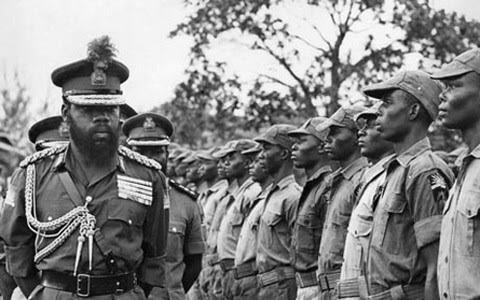
View On WordPress
2 notes
·
View notes
Text

How was the Nigerian Civil War fought?
The Nigeria Civil War was fought like any other conflict, bloody, and destructive. I would rather prefer to refer to it as the Biafran War, the right to self-determination should never be undermined.
The war was fought between the Republic of Biafra and the Nigerian Federation.
The Nigerian Civil War (6 July 1967 – 15 January 1970; also known as the Nigerian-Biafran War or the Biafran War) was a civil war fought between the government of Nigeria and the Republic of Biafra, a secessionist state which had declared its independence from Nigeria in 1967. Nigeria was led by General Yakubu Gowon, while Biafra was led by Lt. Colonel Odumegwu Ojukwu. Biafra represented the nationalist aspirations of the Igbo ethnic group, whose leadership felt they could no longer coexist with the federal government dominated by the interests of the Muslim Hausa-Fulanis of northern Nigeria. The conflict resulted from political, economic, ethnic, cultural and religious tensions which preceded Britain's formal decolonization of Nigeria from 1960 to 1963. Immediate causes of the war in 1966 included ethno-religious violence and anti-Igbo pogroms in Northern Nigeria, a military coup, a counter-coup and persecution of Igbo living in Northern Nigeria. Control over the lucrative oil production in the Niger Delta also played a vital strategic role
#african#nigerian civil war#igbo#igbo culture#odumegwu#fulanis#fulani#hausa#ojukwu#republic of biafra#biafra#nigeria#decolonization#niger
40 notes
·
View notes

